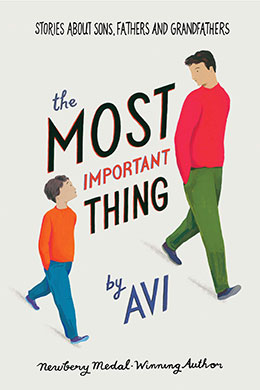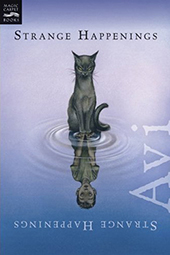The Most Important Thing

Candlewick Press, 2016
buy the book
audio book narrated by
Todd Haberkorn
if you liked this book, try:
Stories about Sons, Fathers, and Grandfathers
What’s this book about?
Luke sees the ghost of his father but can’t figure out what Dad wants him to do. Paul takes a camping trip with the grandfather he’s just met and discovers what lies behind the man’s erratic behavior. Ryan has some surprising questions when he interviews his prospective stepfather for the job. In a compellingly honest collection of stories, multiple-award-winning author Avi introduces seven boys—boys with fathers at home and boys whose fathers have left, boys who spend most of their time with their grandfathers and boys who would rather spend time with anyone but the men in their lives. By turns heartbreaking, hopeful, and funny, the stories show us boys seeking acceptance, guidance, or just someone to look up to. Each one shines a different light on the question “What is the most important thing a father can do for his son?”
Story Behind the Story
Though writing short stories is nothing I do on a regular basis, I read them, and occasionally write them. More often than not I have written them at the behest of editors asking for a story for a themed anthology, such as “Loss,” or “Guns,” “School Life,” or even the beginning of a new millennial, as say, the year 2000.
Resources
Reviews
“In this collection of seven heartfelt stories, the indefatigable Avi breathes new life into an old theme: the relationship between sons and fathers (and the occasional grandfather). Ranging in tone from the somber (“Departed”) to the sprightly (“Tighty-Whities or Boxers?”), the stories have in common a psychological acuity, the presence of inevitable change, and the grace of Avi’s simile-rich style. Interestingly, a number of the stories are notable for the emotional or physical absence of fathers, and often, when they are present, they are feckless (“Going Home”) or bullying (“Beat Up”). In arguably the strongest story, “Dream Catcher,” a boy with a distant relationship with his father is sent to visit the grandfather he has never met. As it happens, the taciturn grandfather is a Vietnam veteran who suffers from PTSD. As for the most amusing story, “The Amalfi Duo,” the grandfather in it suffers from a surfeit of self-confidence that is shaken when his grandson outperforms him. The book is prefaced with an intriguing question: “What’s the most important thing you can do for your son?” The answer, some readers will think, is offered not by a father but, instead by a prospective stepfather. His answer: “Love him.” HIGH-DEMAND BACKSTORY: It would take a full book just to list Avi’s accomplishments; librarians know it and will sense that this is one of the author’s more heartfelt works.” (Michael Cart, Booklist, starred review)
“Multi-award-winning author Avi asks as an epigraph, ‘What’s the most important thing you can do for your son?’ Through seven short stories, he examines the troubled, touching, fractured, burgeoning, and beautiful relationships of seven different young men and their fathers, grandfathers, and, on the periphery, their mothers. There’s Paul, who begins to understand his distant father only after being forced into a weekend with an estranged (and strange) grandfather. There’s the paranormal insistence of Luke’s dead father on spending one last moment with his mourning son. There’s the heartfelt involvement of Ryan in his mother’s acceptance of a marriage proposal. But this isn’t a collection of golden-delicious Norman Rockwell-style optimism. A macho father is ashamed of his passive son, a know-it-all annoying grandfather frustrates his grandson, and an absent father has abandoned his family completely. Avi’s septuplet of stories suggests that the best thing you can do for your son might just be to hope you’ve somehow given him the tools to evolve into an adult who will love and understand you on the other side. Though this is tuned to the XY frequency, don’t discount it as a book for daughters who value such beautiful prose as ‘Now, snow drifting down, slowly, steadily, each flake the ghost of a leaf.’ What Oedipus didn’t know about the intricacies of father/son kinship could fill a book—and has. (Kirkus Reviews, starred review)
“In these seven short stories from Avi (Catch You Later, Traitor), the relationships among fathers, grandfathers, and sons are as varied as the clearly delineated characters themselves. There’s eighth-grader Paul, who is a virtual stranger to his war-veteran grandfather until they are unexpectedly thrown together for a week. In contrast, Luke, 12, is so connected to his father that they are able to communicate even after an accident physically tears them apart. Then there’s 11-year-old Ryan, who insists on interviewing his mother’s boyfriend for “the job of being my father” (“Two written references must be provided, one from kid,” reads the job description Ryan puts together). Whether good, bad, or indifferent, the feelings and outlooks of Avi’s young protagonists are deeply influenced by the men in their lives. Endings are not always happy or neat, but moments of discovery and recognition point the way to change. Avi’s deft incorporation of humor, heartache, and the occasional touch of the supernatural will draw readers in as they ponder how family ties bind in both positive and negative ways. Ages 10–up. (Publishers Weekly, starred review)
“Avi is a master of just about anything he writes, and this collection is superbly crafted and ideal for discussions. (Sharon Verbeten, BookPage)
Audio Book review: “Todd Haberkorn passionately narrates seven stories that illustrate the dynamics of son, father, and grandfather relationships. The stories are told in the first and third person, with the boys ranging in age from 11 to 13. Haberkorn is splendid regardless of age, and his enthusiasm keeps listeners wanting to learn what happens next. In ‘The Amalfi Duo,’ Marco’s grandad is his hero who seems to know everything UNTIL they take recorder lessons together. The subtle change in their relationship is audible in Haberkorn’s thoughtful delivery. Most moving is ‘Departed,’ in which Luke scatters his beloved dad’s ashes on a lake they both loved. ‘Tighty Whities or Boxers?’ is hilarious when high- spirited Ryan ‘interviews’ the guy who wants to marry his mom.” S.G.B. © AudioFile 2016, Portland, Maine (reviewing the audio book)
“In a collection of seven short stories, Avi brings to life the complicated relationships between fathers and sons, grandfathers and grandsons, and stepfathers and stepsons and explores those sons without a father figure at all. In one tale, a teenager is shipped off for a week with a grandfather he never met and who never speaks to his own son, only to find understanding and a new, albeit complicated, relationship. In another, a son arrives at his father’s for the weekend only to discover that he has gained a new stepmother since his last visit. In a different story, a boy interviews his mother’s boyfriend for the position of stepfather. Another selection highlights the complicated relationship between a son who struggles to connect with his father, whose interests are much different than his own. Avi also tackles the impact that the loss of a father can have on his young son, the emptiness that a boy who has never known his father feels, and a grandfather who lives with his son’s family. The son or grandson in each entry is either a young teen or a boy on the edge of his teenage years, which adds to the poignancy and emotional ties. Together, these offerings weave a picture of the relationships that can develop between teenage boys and their fathers and grandfathers—or the lack thereof. The pieces could be read separately in a classroom setting. Though short stories can be a hard sell in a library setting, readers who take a chance on this collection will be rewarded. VERDICT Purchase where short story collections or realistic fiction featuring male characters is needed.” (Carli Worthman, Carmel Middle School, Carmel, IN, School Library Journal)
“Avi offers a multifaceted view of the way boys and men relate to each other, painting neither a perfectly rosy nor dreadfully bleak picture, and he gives space for each character’s personality, making it clear that the relationships are weighted both with history and the boys’ and men’s temperaments. Few of the stories offer complete resolution, instead offering a snapshot of an ongoing and shifting connection. (KQG, Bulletin of the Center for Children’s Books)
“Seven short stories, some written in first person, some in third, offer glimpses into the lives of seven middle-school boys as they navigate complicated relationships with fathers and grandfathers. Divorces, abandonment, estrangement, and death figure into the plots, and the protagonists must learn to find their places in their reconfigured families. Where is home, exactly, when a father leaves and sets up another home elsewhere? How do you forge a relationship with a grandfather when his own son doesn’t get along with him? How do you deal with a father who thinks you’re a coward? Resolutions are never pat, usually leaving protagonists with just the beginnings of a new understanding. ‘What is the most important thing a father can do for his son?’ The stories don’t directly answer the question, but they do show the consequences of a father’s absence, either physically or emotionally, and the varied ways boys find to compensate for the loss. ‘Be there,’ the stories seem to say to fathers and grandfathers. (Dean Schneider, The Horn Book)
“A collection of short stories that readers will find touching, relatable, and sometimes heartbreaking. Author Avi takes an honest storytelling approach to reveal the effects fathers and grandfathers have on the young men in their lives.” (Washington Post)

